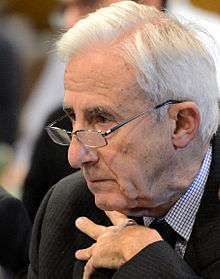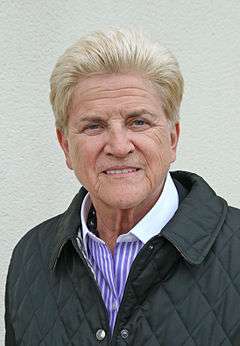1984 Luxembourg general election
General elections were held in Luxembourg on 17 June 1984.[1] The Christian Social People's Party remained the largest party, winning 25 of the 64 seats in the Chamber of Deputies.[2] It formed a coalition government with the Luxembourg Socialist Workers' Party, the Santer-Poos government.[3]
| |||||||||||||||||||||||||||||||||||||
All 64 seats in the Chamber of Deputies 33 seats were needed for a majority | |||||||||||||||||||||||||||||||||||||
|---|---|---|---|---|---|---|---|---|---|---|---|---|---|---|---|---|---|---|---|---|---|---|---|---|---|---|---|---|---|---|---|---|---|---|---|---|---|
| |||||||||||||||||||||||||||||||||||||
| |||||||||||||||||||||||||||||||||||||
.svg.png) |
|---|
| This article is part of a series on the politics and government of Luxembourg |
|
Monarchy
|
|
|
|
Results
| Party | Votes | %[a] | Seats | +/– | |
|---|---|---|---|---|---|
| Christian Social People's Party | 1,148,085 | 36.7 | 25 | +1 | |
| Luxembourg Socialist Workers' Party | 1,104,740 | 31.8 | 21 | +7 | |
| Democratic Party | 614,627 | 20.4 | 14 | –1 | |
| Communist Party of Luxembourg | 165,960 | 4.4 | 2 | 0 | |
| Green Alternative | 169,862 | 4.2 | 2 | New | |
| Independent Socialist Party | 81,002 | 2.4 | 0 | –1 | |
| Others | 6,686 | 0.2 | 0 | – | |
| Invalid/blank votes | 11,657 | – | – | – | |
| Total | 191,651 | 100 | 64 | +5 | |
| Registered voters/turnout | 215,792 | 88.8 | – | – | |
| Source: Nohlen & Stöver | |||||
a The percentage of votes is not related to the number of votes in the table, as voters could cast more votes in some constituencies than others, and is instead calculated based on the proportion of votes received in each constituency.[4]
gollark: STUPID?!?!?!!!¿¡!!???!!¡¿!!!?¡¡???!¡¿!¡¿!!!!¿!!¡¿
gollark: Why install Opus when you could install Potat?
gollark: This is raçísm.
gollark: They're both better. QED.
gollark: You mean single player?
References
- Dieter Nohlen & Philip Stöver (2010) Elections in Europe: A data handbook, p1244 ISBN 978-3-8329-5609-7
- Nohlen & Stöver, p1262
- Nohlen & Stöver, p1236
- Nohlen & Stöver, p1254
This article is issued from Wikipedia. The text is licensed under Creative Commons - Attribution - Sharealike. Additional terms may apply for the media files.
.jpg)

